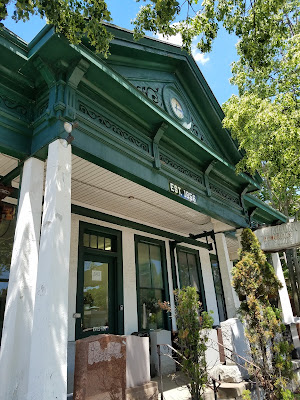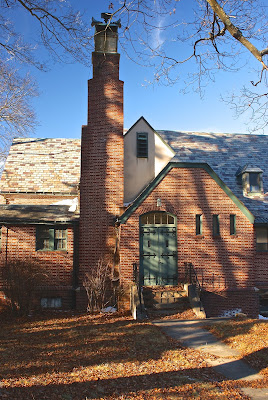From Dave Brigham:
I've had my eye on this place since I was knee-high to a grasshopper. OK, maybe not that long. Perhaps it's only been about 17 years or so, since I lived in Boston's West Roxbury neighborhood.
July 2021 UPDATE: This place has unfortunately been torn down, replaced by a residence.
In business since starting in Quincy, Mass., in 1896, W.C. Canniff & Sons is a family-owned and operated memorial stone company, and has made memorials through the years for legendary Thoroughbred racehorse Seabiscuit as well as the Suffolk Downs horse track, according to The Historic Shops and Restaurants of Boston by Phyllis Meras (2007, New York Review of Books). In addition to its Quincy location and this memorial showroom in West Roxbury, the company operates one in Boston's Roslindale neighborhood, as well as Cambridge.
I love everything about this old building, from the plywood sheets on the small porch, to the hints of red paint, the "BRANCH OFFICE" sign over the door to the old-school phone number, "PARKWAY 3690," near the top of the facade. The building is situated directly across LaGrange Street from rival memorial dealer Thomas Carigg & Son, which opened in 1890. The Holyhood and St. Joseph Cemeteries are located just up the street.
The company's showroom in Cambridge is located in a former comfort station and waiting room for Mount Auburn Cemetery, for visitors who took the trolley, according to Meras's book. The trolley was replaced by trackless trolleys (aka electrified buses) a long time ago.

(W.C. Canniff & Sons Cambridge showroom.)
While I love both of the above buildings, I've saved my favorite for last.
(Canniff's showroom in Roslindale.)
Built in 1935, this memorial showroom and office located in a very urban setting looks like it shares an architect with The Alamo. The place is in somewhat rough shape on the outside, and I'm guessing the inside ain't so great either, but all of that mange is saved by the presence of this in the front yard.
The American Tank and Pump Company manufactured and sold pumps from 1909 until 1949, when the company was sold, according to a posting at OldGas.com. This is the kind of relic that the guys on "American Pickers" love to stumble across.
For more cemetery-related posts, see below:
July 18, 2013, "Cool Stones."
March 5, 2016, "Shakin' All Over."
December 17, 2015, "Bring Out Your Dead."
January 13, 2012, "Peaceful Rest."






